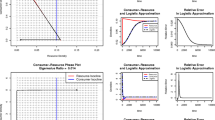Abstract
Ecosystem models must convert a naturally open system into a theoretically closed one. For phytoplankton-herbivore models the form for the parameterization of predation on the herbivores can have a significant effect on the remainder of the model.
Similar content being viewed by others
Literature Cited
Holling, C.S.: The functional response of predators to prey density and its role in mimicry and population regulation. Mem. ent. Soc. Can. 45, 5–60 (1965)
Landry, M.S.: The structure of marine ecosystems: an alternative. Mar. Biol. 35, 1–7 (1976)
Steele, J.H.: The structure of marine ecosystems, 128 pp. Cambridge: Harvard University Press 1974a
—: Stability of plankton ecosystems. In: Ecological stability, pp 179–191. Ed. M.B. Usher and M.H. Williamson. London: Chapman & Hall 1974b
Steele, J.H. and M.M. Mullin: Zooplankton dynamics. In: The sea, Vol. VI. Ed. by E.D. Goldberg. New York, London: Wiley Interscience. (In press)
Author information
Authors and Affiliations
Additional information
Communicated by J.S. Pearse, Santa Cruz
Rights and permissions
About this article
Cite this article
Steele, J.H. The role of predation in ecosystem models. Mar. Biol. 35, 9–11 (1976). https://doi.org/10.1007/BF00386670
Accepted:
Issue Date:
DOI: https://doi.org/10.1007/BF00386670




